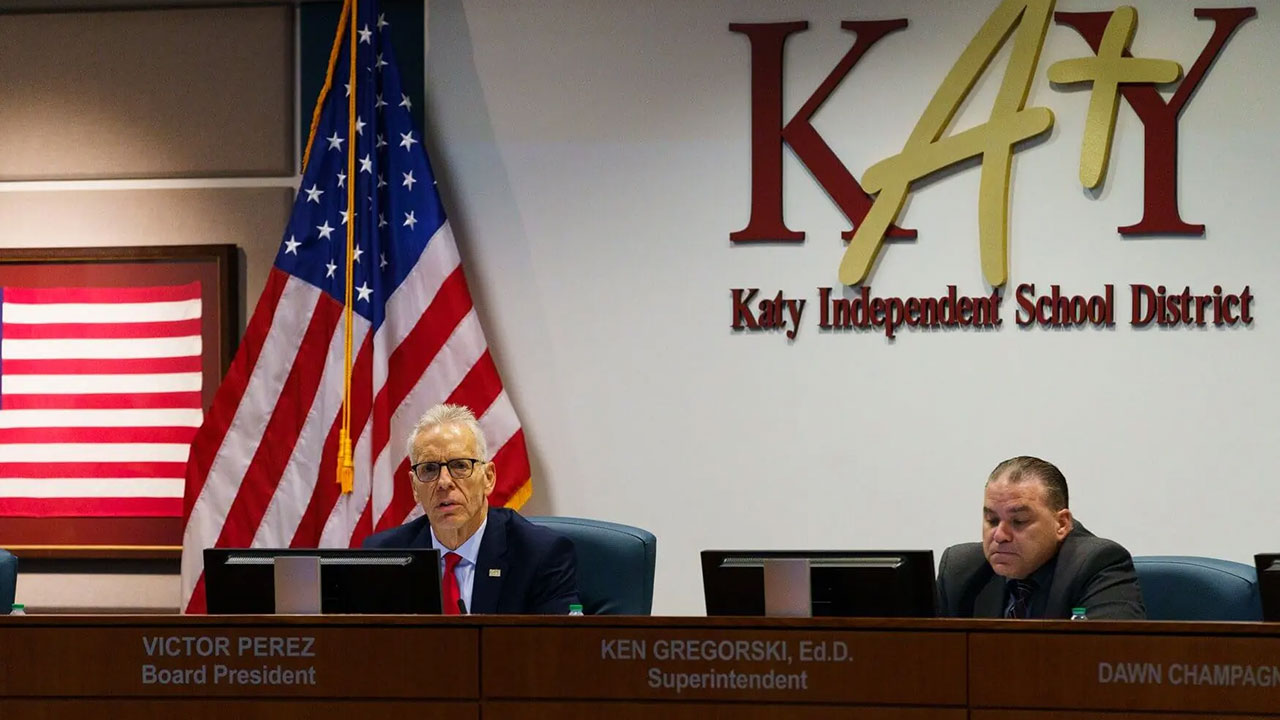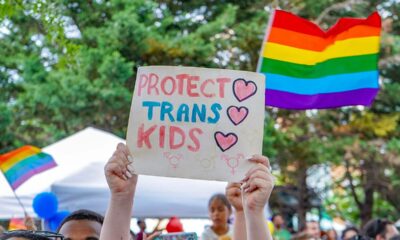US
Gender-affirming care has a long history in the US – and not just for transgender people
The first transgender medical clinic opened in the US in the 1960s. But cisgender and intersex children began receiving similar treatments even earlier – often without their consent.

This article is republished from The Conversation under a CC BY-ND 4.0 license. Read the original article.
In 1976, a woman from Roanoke, Virginia, named Rhoda received a prescription for two drugs: estrogen and progestin. Twelve months later, a local reporter noted Rhoda’s surprisingly soft skin and visible breasts. He wrote that the drugs had made her “so completely female.”
Indeed, that was the point. The University of Virginia Medical Center in nearby Charlottesville had a clinic specifically for women like Rhoda. In fact, doctors there had been prescribing hormones and performing surgeries – what today we would call gender-affirming care – for years.
The founder of that clinic, Dr. Milton Edgerton, had cut his teeth caring for transgender people at Johns Hopkins University in the 1960s. There, he was part of a team that established the nation’s first university-based Gender Identity Clinic in 1966.
When politicians today refer to gender-affirming care as new, “untested” or “experimental,” they ignore the long history of transgender medicine in the United States.
It’s been nearly 60 years since the first transgender medical clinic opened in the U.S., and 47 years since Rhoda started her hormone therapy. Understanding the history of these treatments in the U.S. can be a helpful guide for citizens and legislators in a year when a record number of bills in statehouses target the rights of transgender people.
Treating gender in every population
As a trans woman and a scholar of transgender history, I have spent much of the past decade studying these issues. I also take several pills each morning to maintain the proper hormonal balance in my body: spironolactone to suppress testosterone and estradiol to increase estrogen.
When I began HRT, or hormone replacement therapy, like many Americans I wasn’t aware that this treatment had been around for generations. What I was even more surprised to learn was that HRT is often prescribed to cisgender women – women who were assigned female at birth and raised their whole lives as women. In fact, many providers in my region already had a long record of prescribing hormones to cis women, primarily women experiencing menopause.
I also learned that gender-affirming hormone therapies have been prescribed to cisgender youths for generations – despite what contemporary politicians may think. Disability scholar Eli Clare has written of the history and continued practice of prescribing hormones to boys who are too short and girls who are too tall for what is considered a “normal” range for their gender. Because of binary gender norms that celebrate height in men and smallness in women, doctors, parents and ethicists have approved the use of hormonal therapies to make children conform to these gender stereotypes since at least the 1940s.
Clare describes a severely disabled young woman whose parents – with the approval of doctors and ethicists from their local children’s hospital – administered puberty blockers so that she would never grow into an adult. They deemed her mentally incapable of becoming a “real” woman.
The history of these treatments demonstrates that hormone therapies and puberty blockers have been used on cisgender children in this country – for better or for worse – with the goal of regulating the passage from girlhood to womanhood and from boyhood to manhood. Gender stereotypes concerning the presence or absence of secondary sex characteristics – too tall, too short, too much body hair – have all led parents and doctors to perform gender-affirming care on cisgender children.
For over half a century, legal and medical authorities in the U.S. have also approved and administered surgeries and hormone therapies to force the bodies of intersex children to conform to binary gender stereotypes. I myself had genital surgery in infancy to bring my anatomy into alignment with expectations for what a “male” body should look like. In most cases, intersex surgeries are unnecessary for the health or well-being of a child.
Historians such as Jules Gill-Peterson have shown that early advances in transgender medicine in this country are deeply interwoven with the nonconsensual treatment of intersex children. Doctors at Johns Hopkins and the University of Virginia practiced reconstructing the genitalia of intersex people before applying those same treatments on transgender patients.
Given these intertwined histories, I contend that the current political focus on prohibiting gender-affirming care for transgender people is evidence that opposition to these treatments is not about the safety of any specific medications or procedures, but rather their use specifically by transgender people.
How transgender people access care
Many transgender people in the U.S. have deeply complicated feelings about gender-affirming care. This complexity is a result of over half a century of transgender medicine and patient experiences in the U.S.
In Rhoda’s time, medical gatekeeping meant that she had to live “full time” as a woman and prove her suitability for gender-affirming care to a team of primarily white, cis male doctors before they would give her treatment. She had to mimic language about being “born in the wrong body” – language invented by cis doctors studying trans people, not by trans people themselves. She had to affirm she would be heterosexual and seek marriage and monogamy with a man. She could not be a lesbian or bisexual or promiscuous.
Many trans people still need to jump through similar hoops today to receive gender-affirming care. For example, a diagnosis of “gender dysphoria,” a designated mental disorder, is sometimes required before treatment. Many trans people argue that these preconditions for access to care should be removed because being trans is an identity and a lived experience, not a disorder.
Feminist activists in the 1970s also critiqued the role of medical authority in gender-affirming care. Writer Janice Raymond decried “the transsexual empire,” her term for the physicians, psychologists and other professionals who practice transgender medicine. Raymond argued that cis male doctors were making an army of trans women to satisfy the male gaze: promoting iterations of womanhood that reinforced sexist gender stereotypes, ultimately ushering in the displacement and eradication of the world’s “biological” women. The origins of today’s gender-critical, or trans-exclusionary radical feminist, movement are visible in Raymond’s words. But as trans scholar Sandy Stone wrote in her famous reply to Raymond, it’s not that trans women are unwilling dupes of cis male medical authority, but rather that we have to strategically perform our womanhood in certain ways to access the care and treatments we need.
The future of gender-affirming care
In many states, especially in the South, where I live, governors and legislatures are introducing bills to ban gender-affirming care – even for adults – in ignorance of history. The consequences of hurried legislation extend beyond trans people, because access to hormones and surgeries is a basic medical service many people may need to feel better in their body.
Prohibitions on hormone therapy and gender-related surgeries for minors could mean ending the same treatment options for cisgender children. The legal implications for intersex children may directly clash with proposed legislation in several states that aims to codify “male” and “female” as discrete biological sexes with certain anatomical features.
Prohibitions on hormone replacement therapy for adults could affect access to the same treatments for menopausal women or limit access to hormonal birth control. Prohibitions of gender-affirming surgeries could affect anyone’s ability to access a hysterectomy or a mastectomy. So-called cosmetic surgeries such as breast implants or reductions, and even facial feminization procedures such as lip fillers or Botox, could also come under question.
These are all different types of gender-affirming procedures. Are most Americans willing to live with this level of government intrusion into their bodily autonomy?
Almost every major medical organization in the U.S. has come out against new government restrictions on gender-affirming care because, as doctors and professionals, they know that these treatments are time-tested and safe. These treatments have histories reaching back over 50 years.
Trans and intersex people are important voices in this debate, because our bodies are the ones politicians opposing gender-affirming care most frequently treat as objects of ridicule and disgust. Legislators are developing policies about us despite the fact that most Americans say they do not even know a trans person.
But trans and intersex people know what it is like to have to fight to access the care and treatment we need. And we know the joy of finally feeling comfortable in our own skin and being able to affirm our gender on our own terms.
G. Samantha Rosenthal (Associate Professor of History, Roanoke College), co-founder of the Southwest Virginia LGBTQ+ History Project, authored this story.
The Conversation is an independent, nonprofit publisher of commentary and analysis, authored by academics and edited by journalists for the general public.
Education
Feds investigate another Texas school district for its gender identity mandate
Katy ISD’s board voted this past fall to require staff to notify parents if their child wants to use a different pronoun or identifies as a different gender.

This article originally appeared in The Texas Tribune
 The U.S. Department of Education’s Office for Civil Rights opened an investigation Monday into Katy Independent School District’s gender identity policy on the basis of gender harassment under Title IX. The investigation came nine months after the Houston Landing reported that the district adopted a policy that notifies parents if their child requests to use a different name or pronouns at school.
The U.S. Department of Education’s Office for Civil Rights opened an investigation Monday into Katy Independent School District’s gender identity policy on the basis of gender harassment under Title IX. The investigation came nine months after the Houston Landing reported that the district adopted a policy that notifies parents if their child requests to use a different name or pronouns at school.
Katy ISD did not respond to a request of how many parents have been notified this year under the new policy, which requires staff to inform parents that students are transgender or ask to use different names or pronouns.
The Houston Chronicle reported in December that the district had notified parents at least 23 times since the policy was adopted.
The gender identity policy also bars schools from teaching “gender fluidity” and denies students from competing in sports with the gender they identify with, which mirrors state legislation already regulating K-12 athletics.
Students Engaged in Advancing Texas, a student-led advocacy group, filed a complaint with the U.S. Department of Education in November regarding the policy. Katy ISD graduate and member of SEAT Cameron Samuels labels the investigation as a win against the conservative policies being passed in the district.
“Elected solely on platforms to target marginalized students, far-right school board candidates accomplished exactly what they were elected to do: weaponize identity and neglect students’ educational needs,” they said.
Title IX prohibits sex-based discrimination in educational settings or federally funded activities. Gov. Greg Abbott has loudly voiced his opposition to the federal law recently ordering the Texas Education Agency to disregard the Biden administration’s expansion of Title IX.
“The district is committed to offering equal educational opportunities to our entire community,” a spokesperson from Katy ISD told the Tribune in a response to the investigation. “While we have received the OCR filing and deny any wrongdoing, we are committed to remaining fully cooperative and responsive throughout the process.”
Victor Perez, Katy ISD board president and proponent of the policy, argued that the policy was “mischaracterized” by community members as an attack on its queer and transgender students and instead relieves the burden for staff withholding information from parents. The policy was passed at a board meeting in August with a vote of 4-3 after four hours of public comment.
Alastair Parker, a member of the Cinco Ranch High School Gender-Sexuality Alliance, spoke at the board meeting in opposition to the policy.
Parker and others argued that the policy infringes on the rights of transgender kids to express themselves and opens them to potential harm if they are outed to transphobic parents or caregivers.
Johnathan Gooch from Equality Texas, a nonprofit advocacy group for LGBTQ+ Texans, said he hopes students recognize their power to report policies like this in the wake of the increasing number of legislation targeting LGBTQ+ youth.
This isn’t the first instance in Texas of a gender related policy being investigated on the federal level. Carroll ISD in Tarrant County was reported to have eight open investigations last February after it eliminated protections over race, religion, gender and sexual orientation.
There are documented mental health benefits to using preferred pronouns. A research team at the University Texas at Austin conducted a study in which they concluded that students in gender-affirming environments report 71% fewer symptoms of severe depression, a 34% decrease in reported suicidal ideation and a 65% decrease in suicide attempts.
“When students place their trust in teachers and school administration, the school has a duty to preserve that trust,” Gooch said. “That duty requires schools to ensure that no disclosure would place a student in harm’s way.”
Parker has been out as a transgender man since the seventh grade and is supported by his father, who he resides with. He acknowledged that this isn’t the case for many of his classmates as some have parents that are less accepting.
His teachers have gone by his preferred name and pronouns for his entire high school experience. But since the policy has been enacted, he has seen some of his peers go by their deadnames fearing that their parents would be notified.
Over the past year, other schools across the state have adopted similar policies.
Keller ISD, which is also in Tarrant County, passed a policy in late June that prevents students from using their preferred name and pronouns or using restrooms with the gender they identify with.
The policy was met with retaliation from the Texas American Civil Liberties Union, writing in a letter to the district that the policy is “deeply invasive and unlawful for school administrators to interrogate students’ private medical information in this way.”
As the end of the school year nears, Parker observed the policy being enforced at varying levels of severity by teachers. The passing of legislation or policy like this deters from the ongoing health crisis for queer and transgender youth and is wholly unnecessary, he said.
“If a child’s not telling their parents something like that, it’s for a reason,” he said. “I know that most of the people who are in favor of this are the ones who bounce off whatever their parents have told them to repeat.”
Disclosure: Equality Texas has been a financial supporter of The Texas Tribune, a nonprofit, nonpartisan news organization that is funded in part by donations from members, foundations and corporate sponsors. Financial supporters play no role in the Tribune’s journalism. Find a complete list of them here.
The Texas Tribune is a nonpartisan, nonprofit media organization that informs Texans — and engages with them – about public policy, politics, government and statewide issues.
Amarillo
Appeals court considers whether West Texas A&M drag show was unconstitutionally banned
University President Walter Wendler canceled a drag performance last year, claiming such shows “denigrate and demean women.”

This article originally appeared in The Texas Tribune
 A federal appeals court considering whether West Texas A&M University’s president violated the First Amendment when he canceled a campus drag show last year focused many of their questions Monday on a U.S. Supreme Court ruling that upheld campus non-discrimination policies.
A federal appeals court considering whether West Texas A&M University’s president violated the First Amendment when he canceled a campus drag show last year focused many of their questions Monday on a U.S. Supreme Court ruling that upheld campus non-discrimination policies.
But the panel of three judges used that 2010 case — which said universities can require groups to admit LGBTQ+ students — to suggest that school officials could also ban drag shows because some people find the performances offensive to women.
A lawyer representing a group of West Texas A&M students who’ve twice attempted to host a drag show on campus argued before the 5th U.S. Circuit Court of Appeals Monday that President Walter Wendler discriminated based on viewpoint and censored speech when canceling the performances.
In March 2023, Wendler banned drag shows in response to a student fundraiser that featured drag performers. The president argued the performances “denigrate and demean women,” and shouldn’t be allowed on the public university’s campus.
In September, a federal judge said Wendler acted within his authority to cancel the drag show. In his opinion, U.S. District Judge Matthew Kacsmaryk wrote, at “this point in Free Speech jurisprudence, it is not clearly established that all ‘drag shows’ are categorically ‘expressive conduct.’”
Last month, students with WT Spectrum, the student group at the university, hoped to hold another drag show on campus — to show support for the LGBTQ+ community in a staunchly conservative corner of Texas.
With Wendler’s campus-wide ban still in place, the Supreme Court declined to intervene and the president again ordered the fundraiser from taking place.
The panel of judges hearing the appeal Monday were James Dennis, James Ho and Leslie Southwick.
Many of their questions centered around Christian Legal Society v. Martinez, a case in which the Supreme Court upheld a policy of the University of California, Hastings College of the Law, that bars student groups from excluding members based on status or beliefs.
In 2010, the Supreme Court affirmed that Hastings’ policy does not violate the First Amendment rights of CLS, a group of students that wanted to be officially recognized on campus while not allowing people who engage in “unrepentant homosexual conduct” from joining.
The 5th Circuit judges Monday seemed to suggest that Wendler’s ban was no different from the policy at the center of the 2010 Supreme Court case. One of the judges, who didn’t identify themselves before speaking, asked if plaintiffs intended to use the case in question to overturn CLS.
“Maybe we should overturn CLS?” one of three judges said. “Many people would like CLS overturned.”
Ho equated the policy upheld in CLS with Wendler’s drag ban. He said both intend to make everyone feel included, but the policies have the consequence of targeting one group. In CLS’ case, he said that Christians were singled out on Hastings’ campus for not allowing LGBTQ+ individuals to join. Ho said that previous groups on Hastings’ campus could exclude members, but CLS was singled out by the university’s non-discrimination policy.
JT Morris, senior attorney for the Foundation for Individual Rights and Expression who represented the students, argued that the judges were comparing “apples to oranges” between the two cases.
Morris argued CLS is about a content-neutral policy, while Wendler was clearly discriminating based on viewpoint.
“The First Amendment does not allow the government to use the subjective term ‘offensive’ to restrict speech,” Morris said.
Joseph N. Mazzara, a lawyer with the Texas Attorney General’s Office who represented Wendler, said the students had not suffered any injury as a result of the no-drag policy because there was no future event featuring drag performers planned. Additionally, Mazzara said Wendler’s policy carried no criminal penalties and students could host drag performances off campus.
Mazzara said Wendler’s ban was not a free speech violation, but rather it was akin to banning certain conduct, like skateboarding on the grounds of a monument. He said drag shows constituted conduct, not speech.
“They’re able to do everything they want to do, they’re able to say all the speech they want to [say],” Mazzara said, referring to the student group WT Spectrum. “They just can’t do this one particular thing in this one particular place.”
A judge asked Mazzara how the university would have treated drag shows put on by other student groups, such as a fraternity. The judges seemed to agree with Mazzara that Wendler’s restriction did not target a specific viewpoint.
“If a Christian legal group wanted to have a ‘Drag for Jesus’ event that would also be banned,” Mazzara said.
One judge suggested that some drag shows are offensive to the transgender community, and thus Wendler’s ban would equally protect that population from offensive performances.
Allison Marie Collins, another lawyer from the Attorney General’s Office representing other defendants named in the lawsuit, argued the appellate judges should not impose any restrictions on Texas A&M system Chancellor John Sharp or West Texas A&M Vice President for Student Affairs Christopher Thomas. She argued an injunction against Sharp or Thomas would be overbroad, because it’s clear that only Wendler has acted to stop these shows.
“Neither Chancellor Sharp nor Dr. Thomas have remotely engaged in viewpoint discrimination, exclusion from a public forum or a prior restraint complaint to speech,” Collins said.
In his rebuttal, Morris argued the plaintiffs have standing over Sharp because he has the authority over Wendler to put an end to this restriction on free speech.
“He has the authority to do what’s best for the campus,” Morris said of Sharp. “He should have put an end to this prior restraint, which shouldn’t have lasted a day, and has now lasted a year.”
Disclosure: Texas A&M University and West Texas A&M University have been financial supporters of The Texas Tribune, a nonprofit, nonpartisan news organization that is funded in part by donations from members, foundations and corporate sponsors. Financial supporters play no role in the Tribune’s journalism. Find a complete list of them here.
The Texas Tribune is a nonpartisan, nonprofit media organization that informs Texans — and engages with them – about public policy, politics, government and statewide issues.
Education
Under Katy ISD gender policy, student identities disclosed to parents 19 times since August
Public records obtained by the Houston Landing offer the first glimpse at how often the new, hotly contested policy has been used to disclose LGBTQ+ students’ identities to parents — even if the students aren’t ready.

 Since narrowly passing a controversial gender policy two months ago, Katy Independent School District has sent 19 notifications informing parents that their child identified themselves as transgender or requested to use different names or pronouns at school.
Since narrowly passing a controversial gender policy two months ago, Katy Independent School District has sent 19 notifications informing parents that their child identified themselves as transgender or requested to use different names or pronouns at school.
The number of parental notifications, obtained by the Houston Landing through a public records request, is the first glimpse at how often the new, hotly contested policy has been used to disclose LGBTQ+ students’ identities to parents — even if the students aren’t ready.
So far, the district averages a notification to a parent roughly once every three days.
The district’s policy requires staff to inform parents if their student requests to use different pronouns or names, or if they identify themselves as transgender — and obtain written parental consent to comply with the request. It also prohibits employees from asking for students’ preferred pronouns and discussing “gender fluidity,” and requires students to use bathrooms that align with their sex assigned at birth.
Jarred Burton, a student leader at Tompkins High School’s Sexuality and Gender Alliance, said the number of notifications already sent to parents is both depressing and surprising. Critics, including Katy parents, LGBTQ+ students and local advocates, have blasted the policy as a dangerous measure with the potential to expose students’ gender identities to unsupportive parents, further harming a community that already faces a higher risk of mental health issues than their peers.
“It’s just sad to see this actually happening,” Burton said. “It shows that (the policy) is not a bluff.”
Board members who supported the policy hailed it as a measure that would center parents’ right to be informed about their child’s gender identity and protect teachers from making uncomfortable decisions about concealing such information from parents.
“(Parents are) supposed to be looking after the health and welfare of their child,” Board President Victor Perez said at a late August meeting. “Withholding that information from the parent, that is a great burden on staff.”
It’s unclear how many parents were already aware of their child’s gender identity. District officials also did not make any board members available for an interview on the matter.
“The policy is intended to provide parents and guardians the opportunity to be made aware of their child’s name change request, and the opportunity to grant or deny approval of said request,” Katy spokesperson Nick Petito said in a statement Wednesday.

Ash Thornton, a transgender man and a junior at Tompkins High School, said the number of notifications being sent home will discourage LGBTQ+ students from feeling safe to explore their identities.
“It signals that it’s something bad, them being transgender or expressing gender in a way that’s different,” Thornton said. “It definitely messes up student-teacher relationships.”
Employees are not required to comply with a student’s name or pronoun change even if a parent gives consent, the policy states.
One staff member on every campus is responsible for processing and sending notifications to parents and guardians, Petito said. The policy makes an exception for “cases of suspected abuse.”
Students belonging to LGBTQ+ clubs have told the Landing the policy has caused their schools to become less of a safe space and has instilled fear among LGBTQ+ youth in Katy.
“There’s just been this looming cloud of dread over a lot of people,” Burton said in a September interview. “There’s gonna be a lot of people that get in trouble by their parents or get hurt. … It just sometimes keeps me up at night a little bit because it’s hard to imagine how much hate people can have to pass something like this.”
The number of notifications sent to parents to date leaves Thornton to wonder what else is to come.
“It’s only been two months and there’s already 19, how many more people are going to be affected by even just the end of the semester?” he said.
The Houston Landing is a nonprofit newsroom devoted to public service journalism for all Houstonians.
This article first appeared on the Houston Landing and is republished here with permission.
















